Nzulu | |
|---|---|
| Country | |
| Province | Sud-Ubangi |
| City | Zongo |
Nzulu is a commune in the city of Zongo in the Democratic Republic of Congo. [1] [2]
Nzulu | |
|---|---|
| Country | |
| Province | Sud-Ubangi |
| City | Zongo |
Nzulu is a commune in the city of Zongo in the Democratic Republic of Congo. [1] [2]
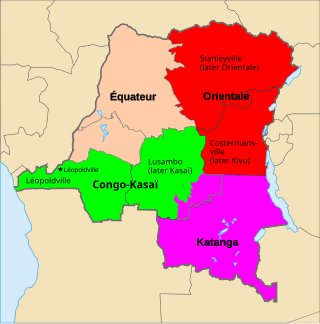
Katanga was one of the four large provinces created in the Belgian Congo in 1914. It was one of the eleven provinces of the Democratic Republic of the Congo between 1966 and 2015, when it was split into the Tanganyika, Haut-Lomami, Lualaba, and Haut-Katanga provinces. Between 1971 and 1997, its official name was Shaba Province.

Kinshasa, formerly Léopoldville, is the capital and largest city of the Democratic Republic of the Congo. Once a site of fishing and trading villages situated along the Congo River, Kinshasa is now one of the world's fastest growing megacities.

Brazzaville is the capital and largest city of the Republic of the Congo. Constituting the financial and administrative centre of the country, it is located on the north side of the Congo River, opposite Kinshasa, the capital city of the Democratic Republic of the Congo.

The Democratic Republic of the Congo (DRC), also known as Congo-Kinshasa and formerly known as Zaire, is a country in Central Africa bordered to the west by the South Atlantic Ocean. By land area, the DRC is the second-largest country in Africa and the 11th-largest in the world. With a population of around 112 million, the Democratic Republic of the Congo is the most populous officially Francophone country in the world. The national capital and largest city is Kinshasa, which is also the nation's economic center. The country is bordered by the Republic of the Congo, Central African Republic, South Sudan, Uganda, Rwanda, Burundi, Tanzania, Zambia, Angola, and the Cabinda exclave of Angola.

The president of the Democratic Republic of the Congo, is the head of state of the Democratic Republic of the Congo and commander-in-chief of the armed forces.

Équateur was a province in the northwest of the Belgian Congo and the successor Republic of the Congo, now known as Democratic Republic of the Congo. It had its origins in the Équateur District of the Congo Free State, the private property of King Leopold II of Belgium. It was upgraded to the status of a province in 1917. Between 1933 and 1947 it was named Coquilhatville. In 1962 it was divided into three smaller provinces, but there were recombined in 1966. Équateur was one of the eleven provinces of the Democratic Republic of the Congo until 2015, when it was split into the new, smaller Équateur province, as well as the Tshuapa, Mongala, Nord-Ubangi and Sud-Ubangi provinces.
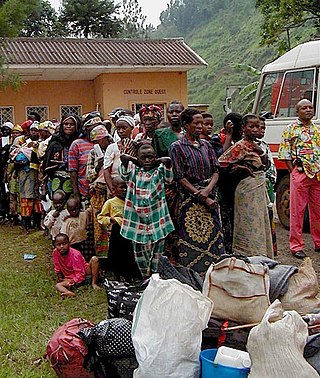
The Second Congo War, also known as the Great War of Africa or the Great African War and sometimes referred to as the African World War, began in the Democratic Republic of the Congo in August 1998, little more than a year after the First Congo War, and involved some of the same issues. The war officially ended in July 2003, when the Transitional Government of the Democratic Republic of the Congo took power. Although a peace agreement was signed in 2002, violence has continued in many regions of the country, especially in the east. Hostilities have continued since in the ongoing Lord's Resistance Army insurgency, and the Kivu and Ituri conflicts. Nine African countries and around twenty-five armed groups became involved in the war.
The Congolese franc is the currency of the Democratic Republic of the Congo. It is subdivided into 100 centimes. However, centimes no longer have a practical value and are no longer used. In April 2022, 2,000 francs was equivalent to US$1.

An inland port is a port on an inland waterway, such as a river, lake, or canal, which may or may not be connected to the sea. The term "inland port" is also used to refer to a dry port.
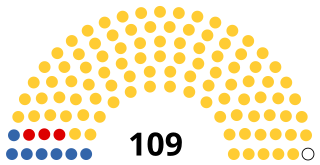
The Senate is the upper house of the Parliament of the Democratic Republic of the Congo. The senate was established in 1960, abolished in 1967 and re-established in 2003.

The Republic of the Congo, also known as Congo-Brazzaville, the Congo Republic or simply either Congo or the Congo, is a country located on the western coast of Central Africa to the west of the Congo River. It is bordered to the west by Gabon, to its northwest by Cameroon and its northeast by the Central African Republic, to the southeast by the Democratic Republic of the Congo, to its south by the Angolan exclave of Cabinda and to its southwest by the Atlantic Ocean.

Health problems have been a long-standing issue limiting development in the Democratic Republic of the Congo.
Prostitution in the Democratic Republic of the Congo is legal but related activities are prohibited. The Congolese penal code punishes pimping, running a bawdy house or brothel, the exploitation of debauchery or prostitution, as well as forced prostitution. Activities that incite minors or promote the prostitution of others have been criminalised. The government does little to enforce the law. During the colonial era and the years that followed independence, the Ministry of Health issued calling cards identifying professional sex workers and provided them with medical health checks. However, this system was abandoned in the 1980s. Public order laws are sometimes used against sex workers. Street prostitutes report harassment, violence and extortion from the police. UNAIDS estimated there are 2.9 million sex workers in the country.

In 2014, an outbreak of Ebola virus disease in the Democratic Republic of the Congo (DRC) occurred. Genome sequencing has shown that this outbreak was not related to the 2014–15 West Africa Ebola virus epidemic, but was of the same EBOV species. It began in August 2014 and was declared over in November of that year, after 42 days without any new cases. This is the 7th outbreak there, three of which occurred during the period of Zaire.
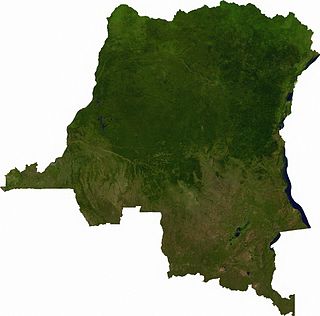
The Democratic Republic of the Congo (DRC) was identified by the World Health Organization (WHO) on 11 May 2017 as having one Ebola-related death.

The 2018 Équateur province Ebola outbreak occurred in the north-west of the Democratic Republic of the Congo (DRC) from May to July 2018. It was contained entirely within Équateur province, and was the first time that vaccination with the rVSV-ZEBOV Ebola vaccine had been attempted in the early stages of an Ebola outbreak, with a total of 3,481 people vaccinated. It was the ninth recorded Ebola outbreak in the DRC.
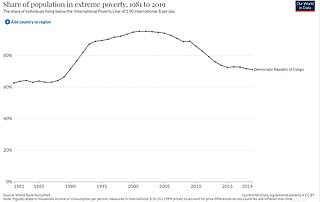
Poverty is widespread and unchecked across the 26 provinces of the Democratic Republic of the Congo (DRC). Despite being the second-largest country in Africa, with an approximate area of 2.3 million square kilometres (890,000 sq mi), and being endowed with rich natural resources, the DRC is the second-poorest country in the world. The average annual income is only $785 US dollars. In 2019, the United Nations (UN) Human Development Index (HDI) ranked the DRC as the 175th least-developed country out of 189 countries with an HDI of 0.480. More than 80% of Congolese people live on less than $1.25 a day, defined as the threshold for extreme poverty.
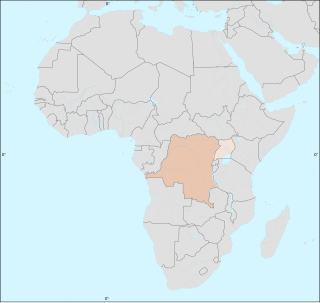
The Kivu Ebola epidemic was an outbreak of Ebola virus disease (EVD) that ravaged the eastern Democratic Republic of the Congo (DRC) in Central Africa from 2018 to 2020. Between 1 August 2018 and 25 June 2020 it resulted in 3,470 reported cases. The Kivu outbreak also affected Ituri Province, whose first case was confirmed on 13 August 2018. In November 2018, the outbreak became the biggest Ebola outbreak in the DRC's history, and had become the second-largest Ebola outbreak in recorded history worldwide, behind only the 2013–2016 Western Africa epidemic. In June 2019, the virus reached Uganda, having infected a 5-year-old Congolese boy who entered Uganda with his family, but was contained.
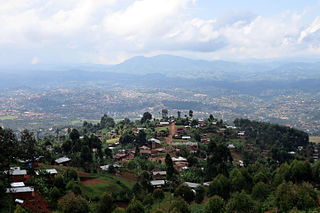
On 7 February 2021, the Congolese health ministry announced that a new case of Ebola near Butembo, North Kivu had been detected the previous day. The case was a 42-year-old woman who had symptoms of Ebola in Biena on 1 February 2021. A few days after, she died in a hospital in Butembo. The WHO said that more than 70 people who had contact with the woman had been tracked.